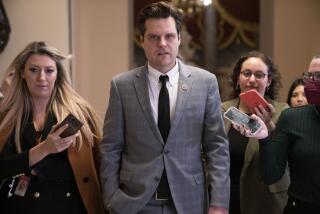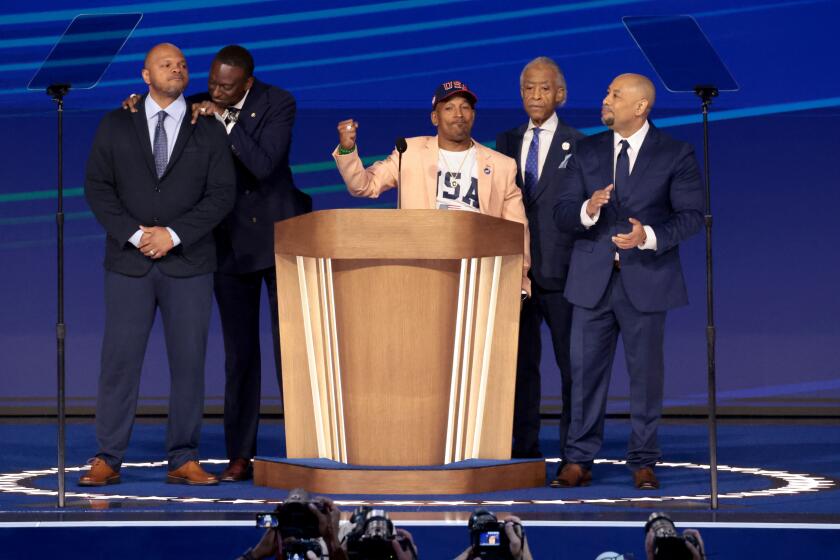Labor’s Push for Reform Finds Solidarity With Kerry, Edwards
Is the deck stacked against workers who want to organize unions? Leaders of the AFL-CIO have been making that case for years. And now, with little notice, the leading contenders for the Democratic presidential nomination have joined them.
Sens. John F. Kerry and John Edwards have endorsed the most ambitious attempt to strengthen organized labor since a Senate filibuster blocked President Carter’s effort to rewrite the labor laws 26 years ago. Each man is touting a fundamental shift in federal labor law that could give unions their last, best chance of reversing the long slide that has reduced their share of the workforce from a high of almost 35% in 1954 to 13% today.
Both Kerry, of Massachusetts, and Edwards, of North Carolina, accept organized labor’s contention that the federal laws governing union organizing are tilted toward business.
“I think people have a right to join [unions],” Kerry said in an interview last week, one day after he visited Southern California grocery workers in the final hours of their long strike against supermarket owners. “I’ve met with too many workers who tell me the stories of harassment in their workplace -- they get fired if they mention the word ‘organize,’ they are ostracized, their shifts will change, things happen to them. That’s wrong.”
At a meeting with union activists in New York last week, Edwards struck almost exactly the same note. “I have seen personally how important the right to organize is, and how important unions are,” Edwards said. “We know what happens when you try to organize. Many times, the big corporations and the employers violate the law. They harass you ... and when they violate the law nothing happens.”
This impassioned identification with the cause of union organizing marks a movement away from President Clinton’s inclination to find a middle ground wherever possible between labor and business. Continuing a change that began in Al Gore’s 2000 presidential campaign, Kerry and Edwards are identifying with organized labor’s agenda more openly and unreservedly than any Democratic nominee since Walter F. Mondale in 1984.
That shift is also visible in the way Kerry and Edwards have toughened their criticism of free trade and sharpened their populist jabs at big business. But the trend is probably most apparent in the way Kerry and Edwards have moved beyond Clinton to highlight the cause of labor law reform -- the political priority that organized labor considers most essential to its long-term vitality.
Today, almost all unions are organized in a two-step process. First, labor organizers must convince at least 30% of a firm’s workers to sign cards supporting unionization. Then a majority of the firm’s workers must vote in an election to join the union.
As Kerry and Edwards noted, employers have stiffened their resistance in those election campaigns, utilizing tactics that unions say intimidate workers -- like firing activists or interminably delaying the vote. The result has been that unions lose most representation elections, especially at firms that actively oppose them.
“The way the law gets played out today in union organizing campaigns, it is very, very difficult for unions to win,” says Fred Feinstein, the general counsel at the National Labor Relations Board under Clinton.
Kerry and Edwards would reshape the playing field with a reform known as card-check recognition. That would force employers to recognize a union if a majority of workers simply sign cards or petitions indicating they want to join.
By eliminating the election stage where management exerts its greatest leverage, that approach could greatly increase labor’s prospects of adding new members. To underscore the point, Kerry and Edwards would also toughen penalties on companies that use unfair labor practices, and establish time limits, with binding arbitration, for firms to reach an initial contract with a new union. Kerry says he would even give preference in federal contracts to companies that remain neutral in organizing drives.
In endorsing these ideas, Kerry insists his aim isn’t to increase the number of workers belonging to unions. “That’s not the goal,” he said. “The goal is to empower people to do what they want to do; let people have a choice. I’m not going to go out and say you ought to do this or do that. That’s not my role.”
But while Kerry and Edwards present these changes as a matter of economic fairness, the prospect of more union members offers obvious political benefits to the Democrats. About three-fifths of union members voted for the Democratic presidential nominee in each of the last two elections. Just as importantly, voters from union households cast about one-fourth of all ballots in 2000 -- a level far above their share of the overall population. More union members would inevitably mean more Democratic votes.
For that reason alone, Republicans would fiercely resist any drive to rewrite the labor laws; many Democrats from Southern states with little union presence would inevitably join them. Kerry and Edwards, as well as AFL-CIO leaders, recognize that labor law reform won’t be politically possible any time soon, even if Democrats retake the White House this fall.
Yet simply forcing the cause of organizing reform onto the campaign agenda represents an enormous advance for unions. By binding the Democrats more closely to this cause, and publicizing it more widely, the unions have increased their leverage to pursue it through means other than congressional legislation, such as local initiatives providing preference in contracting to companies that allow card-check recognition.
“You had an entire Democratic field this time that embraced organizing rights, which is quite extraordinary given the way unions were perceived 10 or 15 years ago,” says Steve Rosenthal, the former political director for the AFL-CIO. “That is a monumental change.”
*
Ronald Brownstein’s column appears every Monday. See current and past columns on The Times’ website at www.latimes.com/brownstein.
More to Read
Get the L.A. Times Politics newsletter
Deeply reported insights into legislation, politics and policy from Sacramento, Washington and beyond. In your inbox three times per week.
You may occasionally receive promotional content from the Los Angeles Times.










